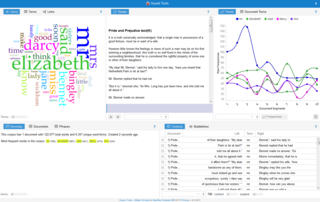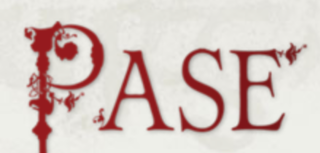Related Research Articles

Birkbeck, University of London, is a public research university, located in Bloomsbury, London, England, and a member institution of the federal University of London. Established in 1823 as the London Mechanics' Institute by its founder, Sir George Birkbeck, and its supporters, Jeremy Bentham, J. C. Hobhouse and Henry Brougham, Birkbeck is one of the few universities to specialise in evening higher education in the United Kingdom.

Roberto Busa was an Italian Jesuit priest and one of the pioneers in the usage of computers for linguistic and literary analysis. He was the author of the Index Thomisticus, a complete lemmatization of the works of Saint Thomas Aquinas and of a few related authors.

Digital humanities (DH) is an area of scholarly activity at the intersection of computing or digital technologies and the disciplines of the humanities. It includes the systematic use of digital resources in the humanities, as well as the analysis of their application. DH can be defined as new ways of doing scholarship that involve collaborative, transdisciplinary, and computationally engaged research, teaching, and publishing. It brings digital tools and methods to the study of the humanities with the recognition that the printed word is no longer the main medium for knowledge production and distribution.
The University of Virginia College of Arts & Sciences is the largest of the University of Virginia's ten schools. Consisting of both a graduate and an undergraduate program, the College comprises the liberal arts and humanities section of the University.

The Prosopography of Anglo-Saxon England (PASE) is a database and associated website that aims to construct a prosopography of individuals within Anglo-Saxon England The PASE online database presents details of the lives of every recorded individual who lived in, or was closely connected with, Anglo-Saxon England from 597 to 1087, with specific citations to each primary source describing each factoid.

HASTAC (/ˈhāˌstak/'), also known as the Humanities, Arts, Science and Technology Alliance and Collaboratory, is a virtual organization and platform of more than 18,000 individuals and 400+ affiliate-institutions dedicated to innovative new modes of learning and research. HASTAC network members contribute to the community by sharing work and ideas with others via the open-access website, by hosting HASTAC conferences and workshops online or in their region by initiating conversations, or by working collaboratively with others in the HASTAC network.
Humanist is an international electronic seminar on humanities computing and the digital humanities, in the form of a long-running electronic mailing list and its associated archive. The primary aim of Humanist is to provide a forum for discussion of intellectual, scholarly, pedagogical, and social issues and for exchange of information among members.

The Digital Classicist is a community of those interested in the application of digital humanities to the field of classics and to ancient world studies more generally. The project claims the twin aims of bringing together scholars and students with an interest in computing and the ancient world, and disseminating advice and experience to the classics discipline at large. The Digital Classicist was founded in 2005 as a collaborative project based at King's College London and the University of Kentucky, with editors and advisors from the classics discipline at large.

The Department of Digital Humanities (DDH) is an academic department and research centre in the Faculty of Arts & Humanities at King's College London. DDH counts amongst the "most visible" digital humanities centres worldwide. Its research activities cover themes such as digital cultures, past and present; technology, media and participation; data worlds; digital economy and society; and digital epistemology and methods.

The Alliance of Digital Humanities Organizations (ADHO) is a digital humanities umbrella organization formed in 2005 to coordinate the activities of several regional DH organizations, referred to as constituent organizations. ADHO's constituent organizations are the European Association for Digital Humanities (EADH), the Association for Computers and the Humanities (ACH), the Canadian Society for Digital Humanities (CSDH/SCHN), centerNet, the Australasian Association for Digital Humanities (aaDH), the Japanese Association for Digital Humanities (JADH), Humanistica, the french-speaking association for Digital Humanities, and the Taiwanese Association for Digital Humanities (TADH), Digital Humanities Alliance for research and teaching innovations (DHARTI)from india etc.

The King's College London Faculty of Arts & Humanities is one of the nine academic Faculties of Study of King's College London. It is situated on the Strand in the heart of central London, in the vicinity of many renowned cultural institutions with which the Faculty has close links including the British Museum, Shakespeare's Globe, the National Portrait Gallery and the British Library. As of 2016, the Times Higher Education comparison of world-class universities ranked it amongst the top twenty arts and humanities faculties in the world.
The School of Literature, Media, and Communication (LMC) is one of six units in the Ivan Allen College of Liberal Arts at the Georgia Institute of Technology. The School focuses primarily on interdisciplinary approaches to the humanities, social sciences, and science/technology to provide "Humanistic Perspectives in a Technological World."
The Department of Information Studies is a department of the UCL Faculty of Arts and Humanities.
Susan Hockey is an Emeritus Professor of Library and Information Studies at University College London. She has written about the history of digital humanities, the development of text analysis applications, electronic textual mark-up, teaching computing in the humanities, and the role of libraries in managing digital resources. In 2014, the University College of London created a Digital Humanities lecture series in her honour.
Ray Siemens is a professor in the faculty of humanities at the University of Victoria, British Columbia, Canada and former Canada Research Chair in Humanities Computing. Siemens is a recipient of the Antonio Zampolli Prize, presented by the Alliance of Digital Humanities Organizations (ADHO) for outstanding contributions to the field of Digital Humanities.
Kenneth George Young FAcSS FRHistS was a British political scientist and historian who was Professor of Public Policy at King's College London in its Department of War Studies. Earlier he was instrumental in the creation of the Department of Political Economy at KCL in 2010, and was its founding Head of Department.
Harold Short is Emeritus Professor of King's College London. He founded and directed the Centre for Computing in the Humanities until his retirement (2010). He was involved in the development with Willard McCarty of the world's first PhD programme in Digital Humanities (2005), and three MA programmes: Digital Humanities, Digital Culture and Society, and Digital Asset Management.

The Index Thomisticus was a digital humanities project begun in the 1940s that created a concordance to 179 texts centering around Thomas Aquinas. Led by Roberto Busa, the project indexed 10,631,980 words over the course of 34 years, initially onto punched cards. It is considered a pioneering project in the field of digital humanities.

Melissa Mhairi Terras is a leading international figure in the field of Digital Humanities. Since 2017, she has been Professor of Digital Cultural Heritage at the University of Edinburgh, and director of its Centre for Digital Scholarship. She previously taught at University College London, where she was Professor of Digital Humanities and served as director of its Centre for Digital Humanities from 2012 to 2017: she remains an honorary professor. She has a wide ranging academic background: she has an undergraduate degree in art history and English literature, then took a Master of Science (MSc) degree in computer science, before undertaking a Doctor of Philosophy (DPhil) degree at the University of Oxford in engineering.
Lori Emerson is an associate professor at the University of Colorado at Boulder and founder of the Media Archaeology Lab, a museum dedicated to obsolete technologies spanning from the late nineteenth century to the twenty-first century. She is known for her work in media archaeology, digital preservation, and digital archives.
References
- ↑ "Researchers: Digital Humanities Research Group". School of Humanities and Communication Arts. University of Western Sydney. 2 August 2013. Retrieved 10 March 2015.
- ↑ Philosophy and Digital Humanities: A review of Willard McCarty, Humanities Computing
- ↑ Willard McCarty
- ↑ Computation and the Humanities. doi:10.1007/978-3-319-20170-2.
- ↑ "Willard McCarty awarded Roberto Busa Prize 2013"
- ↑ Roberto Busa Prize